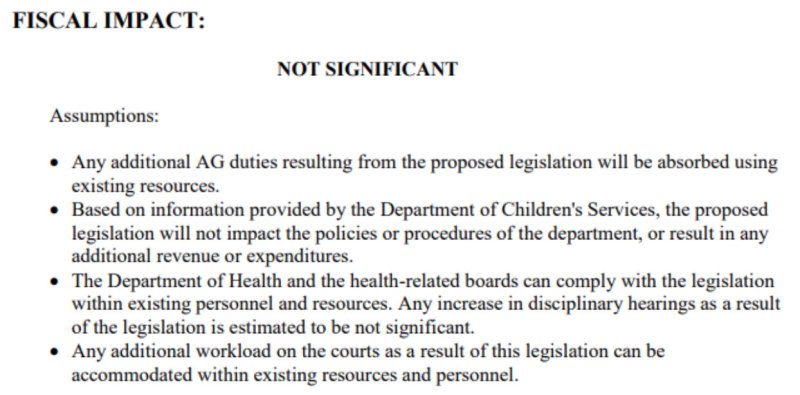Image Credit: Canva
submitted by By Connie Reguli, J.D. (Family Policy Specialist and Activist) –
This year started with three proposed bills for parental rights. Each carrying its own variety of rights for parents versus rights for the government. Each sent a wave of anxiety through the grassroots parental rights groups and an air of excitement in large nationally conservative-branded organizations, like Americans for Prosperity, Eagle Forum, and Alliance for Defending Freedom.
And now we know the winner is – Jeremy Faison’s (R-Cosby) HB2936 and Ferrell Haile (R-Gallatin) SB2749 which passed in Civil Justice on Tuesday, April 2, and moves to the house floor with the final version being Senate Amendment SA0860.
The fiscal note on this bill indicates that there will be an insignificant impact on the taxpayers because any additional duties cast on the Department of Children’s Services, the courts, the Attorney General, and the Department of Health will be accommodated or absorbed using existing resources.

The passage of this legislation has been a battlefield through the Children & Family Affairs Subcommittee and the Civil Justice Committee in the house, and the Senate Judiciary committee.
Citizens have spoken against the bill describing how this legislation actually carves away parental rights that are already guaranteed by the Constitution, while Alliance Defending Freedom (ADF) has spoken in every committee touting this Tennessee legislation as being consistent with parental rights legislation in “seventeen other states.”
ADF felt so strongly about promoting this bill that they brought Michael Farris from Washington DC to convince the House subcommittee to vote for passage.
NOW HERE IS THE TRUTH.
First, ADF was not truthful.
There are not 17 other states that have passed substantially similar legislation. Nineteen states have some sort of parental rights legislation that proclaim that parenting is a fundamental right protected by the constitution. West Virginia’s first bill was passed in 1931 shortly after the United States Supreme Court recognized parental rights in 1923. Meyer v. Nebraska, 262 U. S. 390, 399, 401 (1923). Several states began to follow suit to codify parental rights, but in a fairly straightforward fashion, stating that parental rights are a fundamental right protected by the United States Constitution.
Five states have passed parental rights bills since 2021; Florida, Montana, Georgia, North Dakota, Iowa, Alabama, and North Carolina. In this last tranche of parental rights legislation, the bills have taken a darker more restrictive approach in what is considered positive law. Little by little exceptions are carved out as to when parental rights do not apply. These bills are increasingly allowing state’s rights to trump parental rights, strengthening the “parens patrie” doctrine.
However, here are the significant distinctions in Tennessee.
In 13 states, a parent is a parent period. A few suggest that guardians have parental rights (which they don’t). Tennessee will codify that a ‘parent’ can be any individual who has been granted decision-making power. It does NOT say a person that the parent has voluntarily assigned decision-making power over their child.

“Granted decision-making power” means one thing. It means that a court, a judge, an administrative agency, can take parental rights away and give them to someone else. There is no required burden
of proof in this legislation. So this phrase alone has gutted the constitutional protections of parental rights already ruled on in the United States Supreme Court that requires a finding that a parent is unfit with a high standard of proof before the government can interfere with a parent’s fundamental right to raise their children.
Second, the Tennessee law provides for ‘BLANKET CONSENT’. Which means that everything that your child is involved in, education, healthcare, mental health treatment, extracurricular activities, sports, and maybe even birthday parties will include fine print of a blanket consent and waiver of liability. Guaranteed. Parents will be unaware because it will be hidden within the context of the agreement to participate in any activity with your child. Only one other state has codified BLANKET CONSENT; i.e.Colorado.
Third, Tennessee is leaping further than ANY OTHER STATE LAW in giving corporations and commercial entities (include those created in other states or countries) an exemption from liability to providing ‘emergency care’ for children, whatever and whoever decides what arises to ‘emergency’.

Proponents of this legislation are excited to see a “cause of action” for parents to sue anyone, including government employees and medical personnel, if they violate the enumerated parental rights outlined in this bill. Parents have been faced with so many challenges in recent years that they feel helpless in getting relief. In a handful of cases, parents have attempted to file lawsuits regarding inappropriate materials in libraries or diversity and inclusion curriculum, and they found out that they “lacked standing” meaning there was no right to sue under the law.
Now, proponents of this bill, i.e. ADF, are excited to boast that Tennessee has the best parental bill in the country because of a parent’s right to sue and the right to attorney fees in litigation.
THIS IS THE CATCH.
ADF lobbied for this bill.
ADF is an organization that appears as two different entities: Alliance Defending Freedom and ADF Foundation. Both have the legal address of 15100 N. 90th Street in Scottsdale, Arizona. Alliance Defending Freedom’s 990 tax return for 2021 shows revenues of 104 million with nearly 3 million collected in attorney’s fees. ADF pays Michael Farris over 625 thousand dollars a year. ADF Foundation shows 2021 revenue of 1.6 million, and it also pays Michael Farris 625 thousand dollars a year. That’s right Michael Farris is getting paid more than a million dollars a year to defend freedom.
So, Tennessee’s “Family Rights and Responsibilities Act of 2024” is not about codifying what the United States Supreme Court has already granted us, it is a ‘product’ for sniffing out achievable attorney fees for ADF. Period.
Imagine, if you will, you have a son named Johnny and you find out that a school official has been calling him Julie because your son said he felt like a girl. Now, you call ADF. They bring to Tennessee a host of lawyers, let’s say five or six. They bring a lawsuit against the teacher and the LEA (local education agency) in your county.
ADF files the lawsuit in state court in your county, let’s say Grundy County, the poorest in Tennessee. Let’s say that the judge finds that, yes, the school official did that. What are the damages?
State court judges in Tennessee are not going to award a parent millions of dollars for this kind of case. In fact, there is NO WAY to measure damages in this litigation, except for attorney fees. This bill does not even give you the right to a jury trial so you can plead how emotionally distraught you were to tug at the heartstrings of fellow parents. Nope.
The state court judge who knows that any damage award could affect the taxpayer dollars available to his constituent’s students is going to minimize the monetary award to a parent. HOWEVER, the judge MUST award attorney fees to ADF. And there is no cap on these fees. The judge MUST award the entire amount of fees which is likely to be thousands and even hundred of thousands of dollars.
For conservatives who believed that this bill was going to solidify parental rights in the State of Tennessee and protect children from predators who infringe upon the parent’s right to consent to education, medical care, mental health treatments, and more (the bill enumerated one through twelve), you are wrong.
This bill is a PRODUCT for an onslaught of useless litigation that will burden Tennessee taxpayers with legal fees payable to ADF. School LEA’s will be pinched with the unexpected expense of thousands of dollars in attorney’s fees likely to be paid to ADF or one of its affiliates.
We have marketed away our precious children in Tennessee one more time.
This bill moves to the House floor and then to Governor Bill Lee. Contact your state legislator and ask them to vote no.


